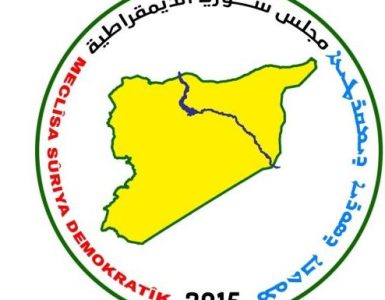The Relations Bureau of the Syrian Democratic Council has recently been active to hold two seminars in the city of Al-Qamishli, in the far north and east of Syria, and in the areas of Tel Hamis and Al-Hol in the southern countryside of the city, in coordination and cooperation with political parties and in the presence of dozens of people from those areas and their surroundings, including representatives of political parties, movements, civil society organizations, intellectuals, writers and jurists.
The seminars included several themes, the most prominent of which was the parties’ vision to resolve the Syrian crisis and its consequences, and put forward the principle of decentralization as a future form of the Syrian state, in addition to addressing the military escalation among jihadist groups in Idlib and Afrin in particular.
The first seminar was held in the town of Tel Hamis in coordination with the Syrian Construction and Development Party, where Daria Ramadan, a member of the Relations Bureau of the Syrian Democratic Council, provided an overview of the establishment of the Syrian Democratic Council, its works and goals.
“The SDC is a Syrian national democratic framework that has taken upon itself to achieve the aspirations of the Syrian people in change and comprehensive democratic transition, achieving gender equality and justice, and guaranteeing women’s rights” she said.
Ramadan also presented a paper on the principle of decentralization and made it clear that it is the most appropriate resolution to preserve the unity of Syria and prevent it from being drawn towards partition, which stimulated the audience to discuss and ask how decentralization can be formed that fits with Syrian society, taking into account that the constitution of the Syrian state in 1918 was decentralized, which is known as “The constitution of King Faisal”.
While another theme of the seminar discussed the Syrian political situation in general and the struggle of the radical jihadist factions in Idlib and Afrin in particular, its repercussions and the Turkish approval of it. Qanaa Al-Harran, the Secretary-General of the Syrian Construction and Development Party, spoke and demanded the attendees to have a position for all components of the region and confront the challenges and difficulties facing the Autonomous Administration.
While the second seminar was in the Readers’ Garden in Al-Qamishli, which was held in cooperation with the Kurdish Left Party in Syria, on the parties’ vision to resolve the Syrian crisis and national identity.
The dialogue seminar dealt with two main themes, the first of which spoke about the parties’ vision to resolve the Syrian crisis, delivered by Muhammed Saleh Abdo, a member of the Political Bureau of the Left Party, in which the participations touched on different visions and many positions to come up with a common vision for the resolution and stress on the principle of the intra-Syrian dialogue to end the crisis and suffering of the Syrian people and build a democratic pluralistic decentralized Syria.
For his part, Muhammed Musa, the Secretary-General of the Kurdish Left Party in Syria, stressed the need to reach a political resolution in Syria, accept other parties, and help all parties, so everyone has the responsibility to defend the homeland, should find resolutions and recognize the other parties.
With regard to the Kurdish-Kurdish dialogue, Musa indicated that there is no alternative to it for the unity of the Kurdish ranks, so the resolution for the Kurdish issue in Syria will be within the framework of the general Syrian national resolution.
In turn, Azhar Ahmed, a member of the Relations Bureau of the Syrian Democratic Council, made a speech during the dialogue seminar in which he praised the efforts of the SDC to achieve the optimal resolution for the Syrian crisis and the projects and visions it presents in order to achieve democracy and end tragedies.
It is mentioned that the Relations Bureau had held another similar seminar in the town of Al-Hol in cooperation with the Democratic Union Party, and there are preparations for other similar seminars in several Syrian regions.











